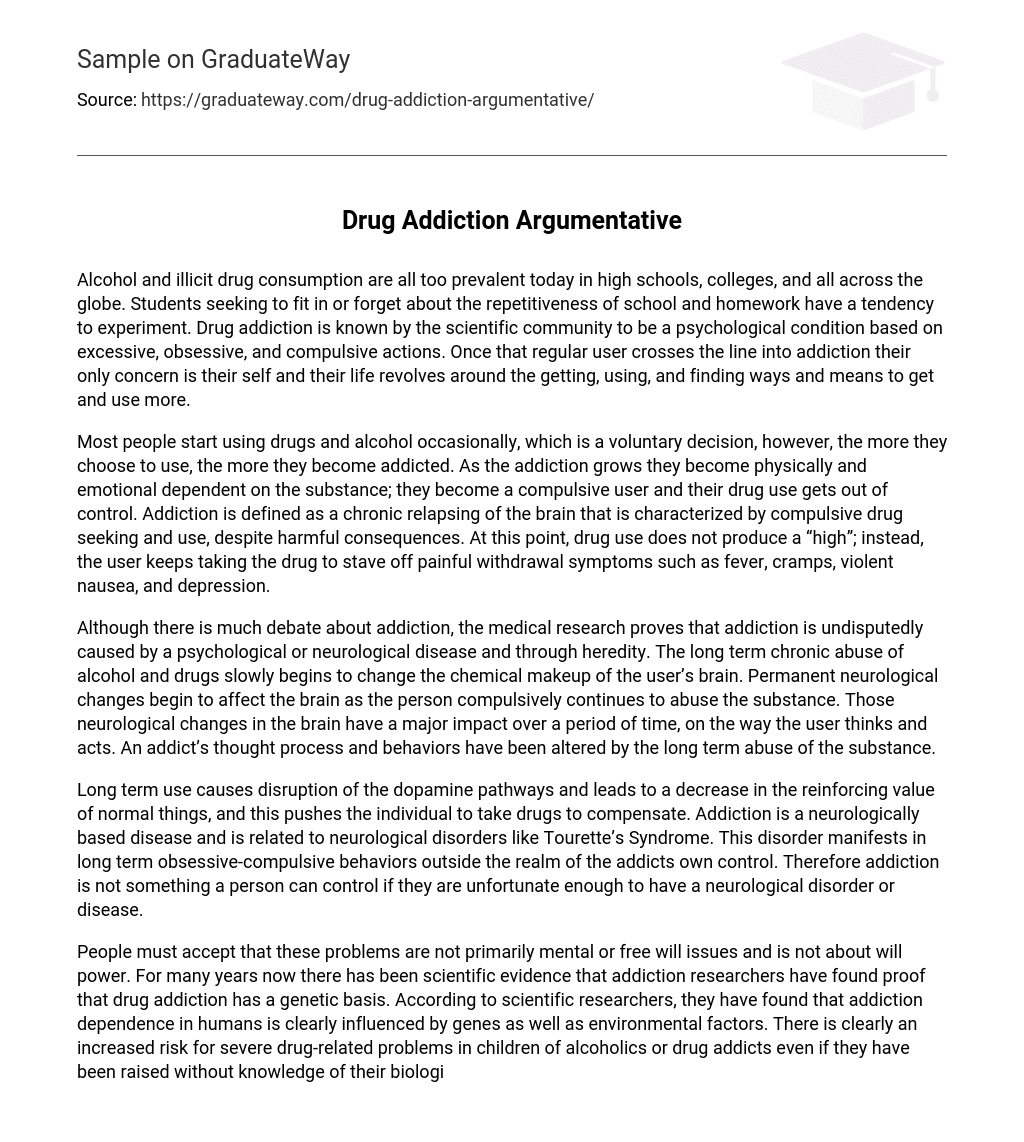Alcohol and illicit drug consumption are all too prevalent today in high schools, colleges, and all across the globe. Students seeking to fit in or forget about the repetitiveness of school and homework have a tendency to experiment. Drug addiction is known by the scientific community to be a psychological condition based on excessive, obsessive, and compulsive actions. Once that regular user crosses the line into addiction their only concern is their self and their life revolves around the getting, using, and finding ways and means to get and use more.
Most people start using drugs and alcohol occasionally, which is a voluntary decision, however, the more they choose to use, the more they become addicted. As the addiction grows they become physically and emotional dependent on the substance; they become a compulsive user and their drug use gets out of control. Addiction is defined as a chronic relapsing of the brain that is characterized by compulsive drug seeking and use, despite harmful consequences. At this point, drug use does not produce a “high”; instead, the user keeps taking the drug to stave off painful withdrawal symptoms such as fever, cramps, violent nausea, and depression.
Although there is much debate about addiction, the medical research proves that addiction is undisputedly caused by a psychological or neurological disease and through heredity. The long term chronic abuse of alcohol and drugs slowly begins to change the chemical makeup of the user’s brain. Permanent neurological changes begin to affect the brain as the person compulsively continues to abuse the substance. Those neurological changes in the brain have a major impact over a period of time, on the way the user thinks and acts. An addict’s thought process and behaviors have been altered by the long term abuse of the substance.
Long term use causes disruption of the dopamine pathways and leads to a decrease in the reinforcing value of normal things, and this pushes the individual to take drugs to compensate. Addiction is a neurologically based disease and is related to neurological disorders like Tourette’s Syndrome. This disorder manifests in long term obsessive-compulsive behaviors outside the realm of the addicts own control. Therefore addiction is not something a person can control if they are unfortunate enough to have a neurological disorder or disease.
People must accept that these problems are not primarily mental or free will issues and is not about will power. For many years now there has been scientific evidence that addiction researchers have found proof that drug addiction has a genetic basis. According to scientific researchers, they have found that addiction dependence in humans is clearly influenced by genes as well as environmental factors. There is clearly an increased risk for severe drug-related problems in children of alcoholics or drug addicts even if they have been raised without knowledge of their biological parents’ problems.
While studies support the view that addiction is genetic that lead to an increased risk of addiction has been a laborious task, since humans express more than one hundred thousand genes. However, in 1997, researchers announced that they had mapped three gene regions in mice that influence susceptibility to physical dependence on drugs or alcohol. Drug use causes the brain to release dopamine, a chemical involved in experiencing pleasure and this surge in dopamine can be so powerful that it compels users to keep taking the drug.
With prolonged use drugs alter the brain so that experiencing pleasure without the drug is nearly impossible. At this point, drug use does not raise dopamine levels or produce a “high”; instead, the user keeps taking the drug to stave off painful withdrawal symptoms. Addiction is a choice and by classifying addiction as a disease, we are just enabling drug addicts to take no responsibility for their own actions in their lives. By labeling addiction as a medical condition it creates a false assumption that addicts have no control over their own behavior. People become addicts because of their behavior, not their brain chemistry.
The disease concept is so popular because it gives people an easy way out; if they inherited their addiction they can’t be responsible for their own behavior. The disease model of addiction is flawed for a number of reasons; first, most people who take drugs do not become addicted, but may take drugs for a period of time, then stop when they choose to do so. Many well respected professors and scientist claim addiction is a scapegoat behavior that has been incorrectly identified as a physical or mental illness, an addict is only a victim of bad science and misguided policy.
No one would choose to wake up sick every day, having to worry about how they are going to get their next fix just to feel normal. People choose to try drugs every day but they don’t try drugs with the intention of becoming addicted or to incur any of the negative consequences or effects, they try them to feel good or escape reality for a while. Drugs are addictive and if the people trying them have a genetic predisposal or neurological problem, after trying them they enjoy the feeling so much that they need that feeling on a daily basis and become addicted.
Medical research confirms this by saying, overtime; drug use changes your brain, making you become addicted to the drug. Drug addiction is a disease and can also be influenced by an addict’s predisposed genetic makeup that affects both brain and behavior. Researchers have identified many biological and environmental factors and have found genetic variations that contribute to the development and progression of the disease. Although there is much debate about addiction, the medical research proves that addiction is undisputedly caused by a psychological or neurological disease and through heredity.





